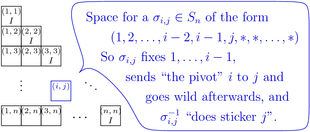11-1100/Homework Assignment 4: Difference between revisions
No edit summary |
No edit summary |
||
| Line 18: | Line 18: | ||
'''Problem 5.''' (Dummit and Foote) In <math>{\mathbb Z}[i]</math>, find the greatest common divisor of <math>85</math> and <math>1+13i</math>, and express it as a linear combination of these two elements. |
'''Problem 5.''' (Dummit and Foote) In <math>{\mathbb Z}[i]</math>, find the greatest common divisor of <math>85</math> and <math>1+13i</math>, and express it as a linear combination of these two elements. |
||
| ⚫ | |||
---- |
|||
| ⚫ | |||
Revision as of 09:06, 15 November 2011
The information below is preliminary and cannot be trusted! (v)
| ||||||||||||||||||||||||||||||||||||||||||||||||||||||
This assignment is due at class time on Tuesday, November 29, 2011.
Solve the following questions
Problem 1. Prove that a ring [math]\displaystyle{ R }[/math] is a PID iff it is a UFD in which [math]\displaystyle{ \gcd(a,b)\in\langle a, b\rangle }[/math] for every non-zero [math]\displaystyle{ a,b\in R }[/math].
Problem 2. (Selick) In a ring [math]\displaystyle{ R }[/math], and element [math]\displaystyle{ x }[/math] is called "nilpotent" if for some positive [math]\displaystyle{ n }[/math], [math]\displaystyle{ x^n=0 }[/math]. Let [math]\displaystyle{ \eta(R) }[/math] be the set of all nilpotent elements of [math]\displaystyle{ R }[/math].
- Prove that if [math]\displaystyle{ R }[/math] is commutative then [math]\displaystyle{ \eta(R) }[/math] is an ideal.
- Give an example of a non-commutative ring [math]\displaystyle{ R }[/math] in which [math]\displaystyle{ \eta(R) }[/math] is not an ideal.
Problem 3. (comprehensive exam, 2009) Let [math]\displaystyle{ A }[/math] be a commutative ring. Show that a polynomial [math]\displaystyle{ f\in A[x] }[/math] is invertible in [math]\displaystyle{ A[x] }[/math] iff its constant term is invertible in [math]\displaystyle{ A }[/math] and the rest of its coefficients are nilpotent.
Problem 4. (Lang) Show that the ring [math]\displaystyle{ {\mathbb Z}[i]=\{a+ib\colon a,b\in{\mathbb Z}\}\subset{\mathbb C} }[/math] is a PID and hence a UFD. What are the units of that ring?
Problem 5. (Dummit and Foote) In [math]\displaystyle{ {\mathbb Z}[i] }[/math], find the greatest common divisor of [math]\displaystyle{ 85 }[/math] and [math]\displaystyle{ 1+13i }[/math], and express it as a linear combination of these two elements.
Problem 6. (Hard!) Show that the quotient ring [math]\displaystyle{ {\mathbb Q}[x,y]/\langle x^2+y^2-1\rangle }[/math] is not a UFD.

